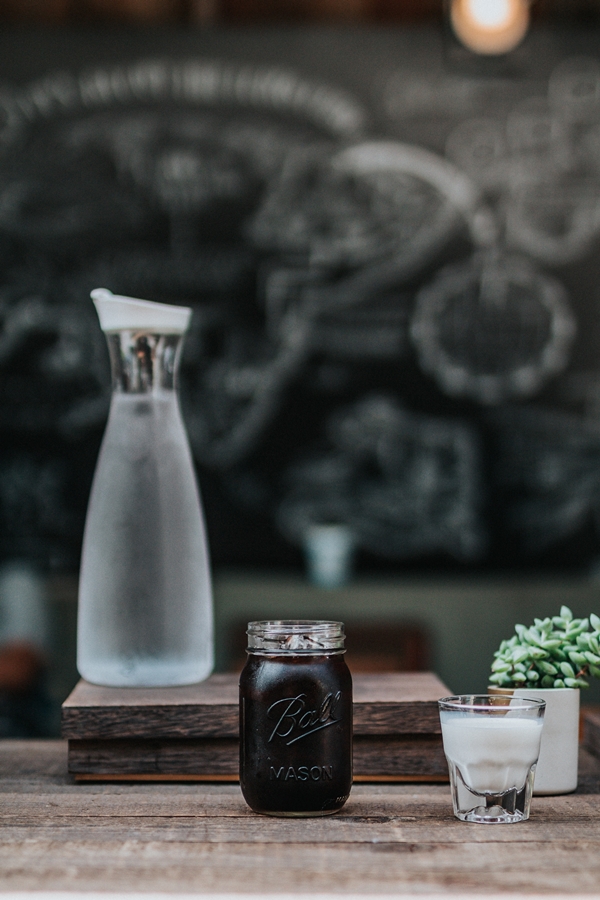There are exactly two ingredients in coffee: ground coffee beans and water. If you take a closer look, you will find that there are thousands of websites and articles about coffee types and coffee beans. Indeed, there are countless factors that influence the taste of your beloved hot beverage such as coffee processing. However, if you think about it briefly, it is surprising that the subject of coffee water is so neglected. Because one thing is for certain: coffee water strongly influences how much you will enjoy your coffee. This is why we have dedicated an entire entry in our coffee wiki to the subject of coffee water in general – and cold drip coffee water in particular.
Below you will find more information on coffee water, cold drip coffee water as well as related topics and facts:
Content
- Coffee, Water, and Taste
- Water temperature
- Water hardness
- PH value
- Freshness
- What constitutes good water?
Coffee, Water, and Taste
The most important thing about coffee – to be honest – is its taste. Many factors in the water you use for making it influence the taste of your coffee: temperature, water hardness, freshness, contact time, and water quality. There are many aspects to consider when it comes to coffee and water.
Water Temperature
During the brewing process, the water temperature has a great influence on which and how many aroma substances are released from the coffee powder. It is possible to brew coffee at any water temperature from ice-cold to boiling hot.
Cold Brew Coffee Water – More Than Cold Coffee
Make coffee using ice cubes? That is not possible. Or is it? For cold brew coffee, the name speaks for itself. Because you can use ice cubes to make cold brew coffee, this coffee speciality is also known as Ice Drip Cold Brew. Coffee extracts brewed using the cold brew method are brewed using ice cubes and/or cold water only.
The exposure time of water and coffee powder is longer than in conventional brewing. To be more precise, you simply increase the brewing time of your cold brew or cold drip coffee to several hours to compensate for the low water temperatures.
The low temperature and long brewing time in cold brew and cold drip coffee bring out completely different flavors than when preparing the same ground coffee powder as filter coffee. Cold brew coffee is therefore often milder, more compatible, and very aromatic.
“Regular” Brewing Temperature
Coffee can be made with hot water, as well. ; ) However, you should not brew coffee using boiling water. You can achieve the best taste results for most forms of coffee preparation with water temperatures between 92°C and 96°C. After boiling, it is best to let your brewing water cool down for a minute before pouring the water onto the coffee powder.
Water Hardness
Water hardness is another factor that will influence the taste of your coffee. Relatively soft to medium-hard water is ideal for coffee preparation. This corresponds to a total water hardness of approx. 5 – 8°dKH for your coffee water.
If the water is harder than 8°dKH, your coffee tastes “flat” and less aromatic. This is because hard water neutralizes coffee acids. This effect increases the longer the water stays in contact with the coffee powder. Especially when it comes to making your own cold drip coffee, overly hard water is fatal.
Coffee water that is softer than 5°dKH also influences the taste of your coffee. As a result, it can easily lead to over-extraction. Accordingly, your coffee becomes extremely bitter and sour – and simply becomes undrinkable.

As a rule, you can very easily find out the water hardness of drinking water in your region by using Google. Alternatively, your water supply company can give you information about the current water hardness.
Filtration
If your tap water is too soft, you can increase the hardness by using granulated minerals. More often than not, however, tap water is fairly hard. Therefore, it makes sense to deal with softening water. You can use table water filters as a simple and inexpensive solution to do so. Those pitchers containing exchangeable activated carbon filters are all you need to improve the taste of your coffee water. And thereby your coffee. Besides, this keeps your kettle virtually lime-free. By the way, activated carbon water filters also remove unwanted substances such as chlorine. Another solution would be to install a filter in your house’s water system.
PH Value
Ideally, your coffee water has a neutral pH value of about 7.0. If your coffee water is more acidic – i.e. below 7.0 pH – this will emphasize the acids within the coffee and, thus, its own taste. So it water with an acidic pH is better for the taste of your coffee than alkaline water with a pH above 7.0.
Freshness
Freshness is not only important for the coffee beans, but also for your coffee water. Good water is fresh, cold, and therefore as oxygen-rich as possible because cold water contains more oxygen. In order to keep the oxygen you can either use cold water and prepare cold brew coffee. If you prefer to heat the water do it as quickly as possible: pour cold water into the kettle/coffee maker and boil it. The reason why you should proceed in that order is that if you take warm water from the tap and boil it you will lose most of your water’s oxygen. This will then affect the taste of your coffee.

When preparing your first coffee after a longer period of time – your holiday for example – you should first let some water run out of the tap before starting to brew your hot beverage. The same applies to coffee machines: change the coffee water in the water container as often as possible. Stale water prevents your coffee from developing its full taste. If some of the water is all the way inside your coffee maker and you cannot access it, there are several options:
- Activate the cleaning program. This way the machine will replace the old water with fresh water.
- Brew your coffee anyway and dump the first few cups.
- Or: Close your eyes and get it over with: Of course you can drink this coffee. It is not poisonous, only much less aromatic.
What Constitutes Good Water?
In this Youtube Video-Tutorial on “How To: Brew Water Chemistry for Coffee & Espresso“, coffee expert Marc from WholeLatteLove.com explains the criteria the Speciality Coffee Association applies to coffee brew water. An how you can test and eventually meet those standards at home. This is how the Specialty Coffee Association’s water standards define good water:
Enjoy!
